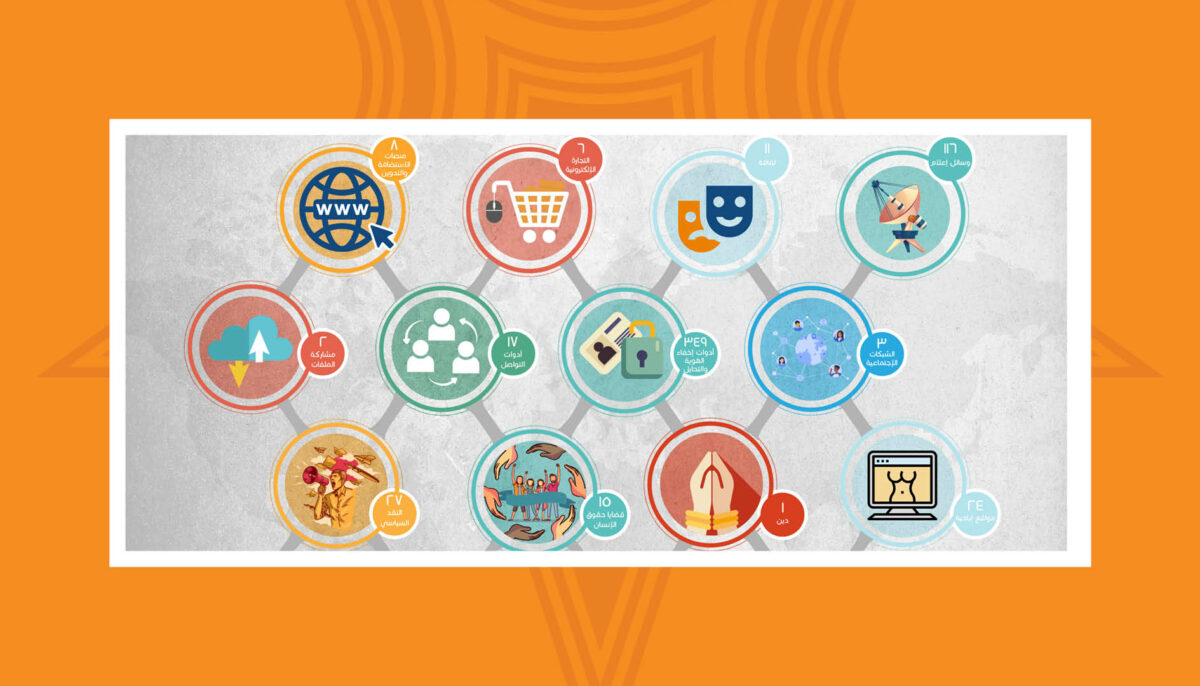Governments in various Arab countries are increasingly investing in financial and human resources to control internet content and the free flow of information. They exercise systematic censorship of information by targeting different aspects of communications technologies. By contrast, several civil society organizations and activists in the Arab region are countering Internet censorship and website-blocking through monitoring and documenting such instances.
Internet censorship in the Arab region is influenced by many geopolitical and cultural factors. For example, as of 2017, Qatari news websites have been blocked in several Arab countries, such as Egypt, the UAE, Palestine, and Saudi Arabia. Additionally, the censorship scene in the Arab region is characterized by security and information coordination in the information and communications technology (ICT) field between a number of Arab countries. In some cases, countries collude on purchasing surveillance equipment and software, as when the UAE bought spyware for Egypt.
In this article, we will discuss a range of tools that can help circumvent online censorship and monitor it in countries that use website-blocking techniques. We will also list some of the most important organizations working in the field of digital rights and anti-censorship.
Types of Blocking Techniques in the Arab Region
Most Arab countries use similar tactics (and sometimes the same software and hardware) to block websites and filter content. These techniques can be summarized as follows:
TCP/IP-based blocking
Each website and connected electronic device has an Internet Protocol (IP) address. It serves as a digital identification for electronic devices and websites, while a “domain” is a name-based identification. Transmission Control Protocol/Internet Protocol (TCP/IP)-based blocking technique targets IP addresses and TCP/IP ports in servers or applications, thus preventing users from accessing the web server hosting the website in question.
This technique does not affect one specific website separately, but rather all other websites hosted on the same server and that share the same IP address. This explains why thousands of websites are blocked in Egypt, given that they are all on the same IP address range as other websites that had been blocked under the pretext that they were publishing political content.
Transmission Control Protocol (TCP): A protocol for transmitting data over networks between devices, sites, and servers, based on their IP addresses.
URL-based blocking
This blocking technique is primarily based on preventing users from accessing a set of links pre-determined by internet service providers. The link in the Hypertext Transfer Protocol (HTTP) request is examined by the ISP, which then compares the request to the list of blocked websites before blocking the user from accessing the link. Although this technique is widely used, it is not always effective in blocking some services such as Voice Over Internet Protocol (VOIP).
DNS-based blocking
This blocking technique focuses on tampering and manipulating DNS (Domain Name System) values using an intermediary device, called a middlebox, that conducts a domain name system examination. When users request access to a blocked website, the middlebox device informs them that they have entered false information, such as the IP address of a blocked web server.
The Domain Name System (DNS) is a decentralized system that stores information related to Internet domain names, especially their IP addresses. It also translates domain names into IP addresses.
DPI-based blocking
This blocking technique is based on filtering content by analyzing the forms and types of specific applications or websites. This technique is very intensive, as it requires comparing the requested content to a list of blocked applications or websites. The decision to block certain content is then based on this comparison. This Deep Packet Inspection (DPI)-based technique can be effective in blocking VOIP services.
Deep Packet Inspection: The deep packet inspection technique enables internet service providers to obtain a large amount of information about users’ communications and usage habits. This may allow the telecom operator to perform a behavioral analysis on users.
Accessing Blocked Websites
The Arab region has a long history of Internet censorship and website blocking. In some countries (such as the Gulf States), there are some tools that can bypass blocks imposed by the government, such as proxy tools and Virtual Private Network (VPN). These tools are widely used in the Gulf States because of the great number of blocked websites in the region.
There are many techniques that enable users to access blocked websites, such as using Tor browser or different VPN services.
VPN Services
VPN (Virtual Private Network) services allow the user to use an IP address other than the one assigned to their geographic location. This is achieved by configuring a virtual private network through VPN servers. It is preferable to use open-source, reliable software and protocols. Free services are not recommended because some may contain malware or data-gathering software.
Some blocked websites offer users other ways of accessing them, such as:
- Using alternative links: The website simply uses a domain that is different from the one that is blocked.
- Using proxy URLs: The blocked website provides links to its content through a proxy service that makes it seem as if their device is connected from a different geographic location.
- Content Delivery Network (CDN): The website provides a link to its content via a “content delivery network.” This means that the website can be blocked only by blocking the entire content delivery network.
Content Delivery Network (CDN): A network of synchronous servers in different geographic locations distributed over the Internet. It contains copies of some of the most popular Internet content. If users want to access online content supported by this feature, the network will send them to the nearest server that contains a copy of the required content.
- Using intermediary services such as the Google Cloud Platform, which includes a copy of the site with a link different from the one that’s blocked.
Tor Browser
Tor browser is one of the most private, secure, and anonymous browsers available. It is also one of the most reliable browsers for circumventing online censorship. It can be used on different computer operating systems (Windows, GNU/Linux, Mac), as well as on smartphone operating systems (Android and iOS).
Tor provides Internet connectivity via the Tor network, which uses the Onion routing system. Tor encodes data packets before they are sent, removes a portion of the packets that can identify the user, then sends the data packet through encrypted virtual tunnels which are set up by a random set of servers running the Tor network, thus making it untrackable.
Blocked Website Monitoring Tools
There are many tools and tactics that journalists and technicians can use to monitor and document blocked websites in their countries, as well as examine and collect statistics and data about blocked websites.
OONI Probe
OONI Probe is one of the most popular and effective tools developed by Tor Project. It is a software that provides a wide range of tests conducted via applications to collect measurements that check blocked content. It allows users to monitor blocked websites, blocked instant messaging applications and blocked VPN services, or detect Middleboxes (an appliance that transforms, processes, inspects, and filters traffic and websites on the network). OONI Probe also helps in measuring Internet performance and speed.
The OONI Probe app can be used on the following operating systems: Android, iOS, Windows, Mac OS, and GNU/Linux.
TCP Connection Tests
Technicians and researchers may sometimes need to perform Transmission Control Protocol (TCP) connection tests on blocked websites and IP addresses. To this end, they use tools such as Telnet, Curl and NC. Researchers or technicians may use these types of tests to scrutinize user-site communication data, check ports, and compare results between in-country communication and outside communication (using VPN, for example) to identify which websites are blocked.
Reverse DNS Lookup
Technicians and researchers may need to perform a reverse DNS lookup to audit DNS data on blocked websites. They can use tools such as nslookup, Dig and Host.
They can also use services provided by certain websites, such as Securry and Geekflare. This type of test helps researchers and technicians verify and inspect the available values of the domain name system (DNS) and check whether the ISP is blocking websites by manipulating the domain name system.
Reverse IP Lookup
Researchers or journalists may need to examine a particular IP address to extract the domains that are registered on it. This type of information can be obtained by performing a reverse IP lookup by using a tool such as Crips or by using the ViewDNS website or the Hacker Target website. Researchers and technicians can resort to this procedure to review the domains that are registered on a blocked domain under a particular IP address. Any random blocking of domains can be detected when it is registered on an IP-blocked website.
Collection of Data and Information on a Specific Domain
Several tools can be used to gather data and information on a specific IP domain, such as the DNSlytics site or the Crips tool.
Organizations Promoting Digital Rights and Countering Internet Censorship in the Arab Region
Several Arab and international civil organizations are working on promoting digital rights and countering Internet censorship. They provide information, data, and statistics on blocked websites in different Arab countries. You can follow these organizations to learn more about the latest developments in practices related to website-blocking.
OONI: An observatory under the Tor Project. It is in the process of developing a software called OONI Probe, which will provide tools to collect measurements from the network so as to make them available to everyone. The site also reports on the status of Internet censorship in several countries, including Arab countries. It provides an open platform, called OONI Explorer, which displays millions of measurements collected from users in almost every country around the world.
Community for Technology and Law – Masaar: A group of legal experts and technologists interested in promoting digital rights and related freedoms in Egypt. Masaar’s work focuses on integrating technology with law and understanding their impact on individuals, society, and fundamental freedoms. Masaar publishes technical and legal reports, as well as statistics on Internet censorship and website-blocking.
SMEX: An Arab civil group operating from Lebanon to promote digital rights in the Arab region through research, campaigns and advocacy. SMEX provides news, reports and articles on digital rights, including Internet censorship in the Arab region, policies, and digital safety and security.
Arab Network for Human Rights Information (ANHRI): A legal institution that includes lawyers and researchers defending freedom of expression in Egypt and the Arab region, particularly press freedom, as it considers the latter to be a gateway enabling people to obtain all other human rights. ANHRI has been supporting and promoting Internet-related rights for years, especially the freedom of digital expression. Since 2004, ANHRI has been issuing periodic reports on the state of Internet freedom in the Arab region.
AccessNow: An international organization that supports digital rights, such as the right to privacy, freedom of expression, digital security, and human rights in the business sector. AccessNow activities in the Arab region include monitoring Internet censorship and blocked websites.
Citizen Lab: A multidisciplinary laboratory based at the University of Toronto in Canada. The laboratory issues studies and reports that focus on technical aspects in the fields of communications and Internet surveillance, Internet censorship, website-blocking and other technologies that pose a threat to human rights. Citizen Lab operates on an international scale and has published a number of studies and reports related to several Arab countries, such as Egypt, Tunisia, Saudi Arabia, and the UAE.
Association for Freedom of Thought and Expression (AFTE): An Egyptian institution that supports freedom of expression in Egypt, particularly with regard to freedom of the press, freedom of innovation and digital rights. It also addresses topics related to Internet censorship.



